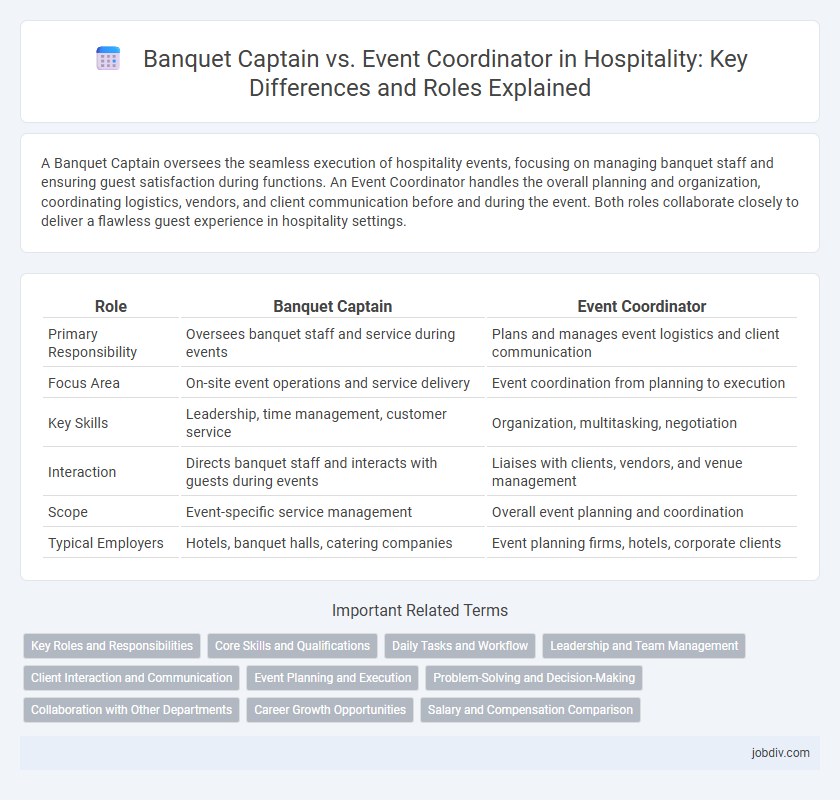A Banquet Captain oversees the seamless execution of hospitality events, focusing on managing banquet staff and ensuring guest satisfaction during functions. An Event Coordinator handles the overall planning and organization, coordinating logistics, vendors, and client communication before and during the event. Both roles collaborate closely to deliver a flawless guest experience in hospitality settings.
Table of Comparison
| Role | Banquet Captain | Event Coordinator |
|---|---|---|
| Primary Responsibility | Oversees banquet staff and service during events | Plans and manages event logistics and client communication |
| Focus Area | On-site event operations and service delivery | Event coordination from planning to execution |
| Key Skills | Leadership, time management, customer service | Organization, multitasking, negotiation |
| Interaction | Directs banquet staff and interacts with guests during events | Liaises with clients, vendors, and venue management |
| Scope | Event-specific service management | Overall event planning and coordination |
| Typical Employers | Hotels, banquet halls, catering companies | Event planning firms, hotels, corporate clients |
Key Roles and Responsibilities
A Banquet Captain oversees banquet operations, ensuring staff execute event setups, food service, and guest satisfaction according to organizational standards. An Event Coordinator manages the overall planning, client communication, and logistics, coordinating vendors, timelines, and event design to meet client expectations. Both roles require strong leadership and organizational skills but focus on different phases of event execution and management within hospitality.
Core Skills and Qualifications
Banquet Captains excel in leadership, communication, and team management, ensuring smooth event execution and guest satisfaction through real-time problem-solving and coordination. Event Coordinators possess strong organizational skills, attention to detail, and expertise in budgeting, vendor negotiation, and timeline management to plan and execute successful events. Both roles require proficiency in hospitality software, customer service, and a deep understanding of event logistics to create seamless experiences.
Daily Tasks and Workflow
Banquet Captains oversee on-site event execution, coordinating banquet staff, managing room setups, and ensuring seamless service during hospitality events. Event Coordinators handle pre-event planning, vendor communication, and client liaison to design the event flow and logistics. Daily tasks of Banquet Captains prioritize real-time problem-solving and guest experience, while Event Coordinators focus on scheduling, contract management, and detailed event programming.
Leadership and Team Management
The Banquet Captain leads frontline banquet staff, ensuring seamless event execution through direct supervision, task delegation, and real-time problem-solving. The Event Coordinator focuses on overall event planning, client communication, and coordinating between departments to align logistics and services. Effective leadership in hospitality requires the Banquet Captain's hands-on team management and the Event Coordinator's strategic oversight to deliver exceptional guest experiences.
Client Interaction and Communication
Banquet Captains prioritize direct, real-time communication with clients during events, ensuring smooth service and immediate issue resolution. Event Coordinators handle pre-event client interactions, meticulously planning and finalizing details to align with client expectations. Clear and continuous communication between both roles is essential to deliver a seamless hospitality experience.
Event Planning and Execution
A Banquet Captain oversees on-site event execution, managing banquet staff, timing, and service quality to ensure seamless guest experiences during hospitality events. An Event Coordinator focuses on pre-event planning, coordinating logistics, vendor communication, and client requirements to align event goals with efficient workflows. Both roles collaborate closely to guarantee flawless event operations, balancing strategic planning with real-time management in hospitality settings.
Problem-Solving and Decision-Making
The Banquet Captain excels in real-time problem-solving by managing on-site issues such as guest requests, staff coordination, and unexpected logistical challenges to ensure smooth event execution. In contrast, the Event Coordinator focuses on pre-planning decision-making, including vendor selection, event scheduling, and client communication to align event details with client expectations. Both roles require strong decision-making skills, but the Banquet Captain thrives in dynamic, problem-solving environments, while the Event Coordinator specializes in strategic planning and coordination before the event.
Collaboration with Other Departments
Banquet Captains work closely with kitchen, service, and housekeeping teams to ensure seamless event execution, coordinating staff and managing real-time adjustments. Event Coordinators collaborate extensively with sales, marketing, and client relations departments to align event objectives with overall business goals and client expectations. Effective communication between both roles and various departments is essential to deliver a flawless hospitality experience.
Career Growth Opportunities
Banquet Captains typically gain hands-on experience managing event logistics and leading service teams, which builds strong operational skills essential for advancing to higher supervisory roles within hospitality management. Event Coordinators often develop expertise in client relations, budgeting, and vendor negotiations, positioning them for career growth in event planning, sales management, or marketing departments. Both roles offer distinct pathways in the hospitality industry, with Banquet Captains focusing on execution and Event Coordinators emphasizing strategic planning and client engagement.
Salary and Compensation Comparison
Banquet Captains typically earn an average salary ranging from $35,000 to $50,000 annually, with compensation influenced by venue size and location, while Event Coordinators command higher wages averaging between $45,000 and $70,000 per year due to broader responsibilities and project management skills. Benefits for both roles often include performance bonuses, health insurance, and potential tips for Banquet Captains, whereas Event Coordinators may receive additional incentives tied to event success and client satisfaction. Salary growth prospects favor Event Coordinators, reflecting their strategic role in planning, budgeting, and client interaction compared to the operational focus of Banquet Captains.
Banquet Captain vs Event Coordinator Infographic

 jobdiv.com
jobdiv.com